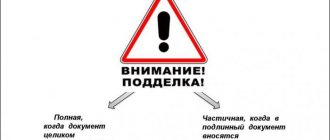The plaintiff, as an interested party, and the court, as a guarantor of respect for the rights of citizens, are equally interested in the correct interpretation of the situation that caused the appeal to the courts. An adequate interpretation is possible only with the truthful presentation of information by all parties to the legal process: plaintiff, defendant, witnesses. It happens that incorrect information is provided to one of these parties, which leads to misleading the court. This may be done intentionally or unintentionally.
Article of the Criminal Code of the Russian Federation for forged documents
Article 303 on forgery of documents in court for the purpose of obtaining benefits establishes sanctions for falsifying evidence in civil, administrative and criminal cases. The punishment for providing a court with a deliberately false document depends on the type of illegal act, as well as on the identity of the offender. It could be:
- participant in the process;
- his representative;
- an official who is authorized to initiate proceedings or draw up protocols;
- interrogator;
- investigator;
- prosecutor;
- advocate;
- An employee of the Ministry of Internal Affairs engaged in operational work.
The Criminal Code of the Russian Federation has other articles establishing liability for forgery of official documents. For example, for forgery of a document granting rights or releasing from obligations, you can be punished under Art. 327 of the Criminal Code of the Russian Federation, for knowingly false testimony in court - under Art. 306 of the Criminal Code of the Russian Federation. According to these standards, as well as according to Art. 303 of the Criminal Code of the Russian Federation for submitting false documents to the court under the Criminal Code of the Russian Federation faces punishment ranging from a fine to prison.
Falsification of evidence in civil proceedings: concept
Falsification of evidence in court is a criminal offense for which liability is provided. During the process, the parties present to the court evidence of their innocence, and the future verdict largely depends on their persuasiveness. Evidence refers to facts, information, material things and other evidence.
To increase the chances of a positive judicial decision, some citizens resort to falsifying evidence, that is, providing deliberately false, unreliable information.
But they should not forget that if the fact of falsification is revealed:
- faces criminal liability;
- the court verdict will be reviewed.
Falsification of evidence refers to the deliberate misrepresentation of facts in order to influence the outcome of a civil trial. This act has objective and subjective sides. The objective side consists of making changes to real evidence, which makes it unreliable or false.
Most often in practice we encounter the following types of offenses:
- forgery of signatures;
- distortion or additional printing of official documentation (correction of dates, signatures, etc.);
- changing the composition of the documentation (i.e. entering into it false information that distorts information);
- forgery of documents, etc.
When falsifying, a mandatory attribute is the presence of intent on the part of the criminal. Those. he must resort to misrepresentation intentionally with a personal interest in such action and be aware of the legal consequences of his actions. This is the subjective side of the crime.
If a person accidentally made a mistake in a document, then there is no talk of an offense; there will be no crime in this case.
Providing a false expert opinion to the court or incorrectly translating an official document from a foreign language also does not constitute falsification, even if these actions resulted in an unlawful judicial decision.
The moment of commission of the crime will be the date of provision of false information to the court. After which the crime will be considered committed.
The fact of falsification of evidence can be detected as follows:
- by comparing data from different sources;
- comparison of data from the certificate with information from the database archive;
- conducting a survey of persons who were responsible for submitting documents;
- comparison of signature samples;
- conducting an examination.
Not only the person who provided false evidence, but also other persons involved in the preparation of documents may be held liable. For example, a doctor who issued a falsified certificate will be held accountable as an accomplice.
Responsibility is provided not only for the participant in the process, but also for his representative in civil proceedings. In this case, the court will take into account whether there was a preliminary conspiracy between these persons.
Responsibility for providing false documents
Before moving on to liability for submitting false documents to the court, we will consider sanctions under related articles relating to forgery of papers and giving false testimony.
According to Art. 327 of the Criminal Code of the Russian Federation, one of the following sanctions is possible:
- restriction of freedom up to 2 years;
- forced labor for up to 2 years;
- arrest for up to six months;
- imprisonment up to 2 years.
If the paper was falsified to hide another crime, the maximum penalty is 4 years in prison. If a forged document is used, a penalty ranging from a fine to six months of arrest may be imposed.
It is also possible to fabricate evidence in the event of a false denunciation. This category includes cases in which there was no crime as such, and the suspect is innocent, but a statement was filed against him, knowing in advance about the citizen’s innocence. In such a situation, the punishment will be imposed under Art. 306 of the Criminal Code of the Russian Federation. The offender can receive a sentence of up to 6 years.
In court you must tell only the truth. Participants are warned in advance about the liability for giving false testimony. It is defined in Art. 307 of the Criminal Code of the Russian Federation. Under this standard, he faces up to 5 years in prison.
Note!
The guilty person can be released from punishment if he admits before the sentencing that he lied during the trial.
Do you have any questions?
To get the most detailed advice on your issue, you just need to follow any of the suggested options:
- Request a consultation using the form
on our website - Or just call the number: 8 800 350-83-74
Providing false information to the tax office
The corpus delicti under Art. 199 of the Criminal Code of Russia, consists of evading an enterprise or individual entrepreneur from paying taxes/duties by failing to provide a declaration or other documents that must be provided in accordance with the legislation of the Russian Federation, or by entering into a declaration or other tax documentation knowingly false information when committing evasion in this way large size.
The objective side is the deliberate inclusion of false information in tax documentation. Other (except for the declaration) documents mentioned in Art. 199 are the documents provided for by the Tax Code of Russia and other documents adopted in accordance with this Federal Law Code, which act as the basis for calculating taxes/fees and for paying them.
| Pass during quarantine | Payment and registration of sick leave during quarantine |
| Article 6.3 of the Code of Administrative Offenses | Article for violating the self-isolation regime |
- Didn't find the answer to your question? Find out how to solve exactly your problem - call right now:
- Federal number -
- Moscow region, Moscow -
- Leningr. region, St. Petersburg -
- It's absolutely free and fast!
Use of false documents in court
If false documents are submitted to the court, liability arises under Art. 303 of the Criminal Code of the Russian Federation. It contains four parts, each of which lists aggravating factors. The punishment for falsifying court documents will be more severe if:
- An inquiry officer, investigator, prosecutor or lawyer is suspected of falsification;
- a case of a serious or especially serious crime is being considered;
- grave consequences resulted from the forgery;
- the goal of the criminals was to criminally prosecute an innocent person, causing harm to his honor or reputation.
For civil and administrative cases, the article of the Criminal Code of the Russian Federation for providing false documents to the court defines the following types of punishment:
- fine up to 300 thousand rubles;
- compulsory work up to 480 hours;
- correctional labor for up to 2 years;
- arrest up to 4 months.
If forgery of documents in court occurred during the consideration of a criminal case, and the suspect is an inquirer, investigator, prosecutor or defense attorney, one of the following sanctions is faced:
- suspended sentence up to 3 years;
- forced labor for up to 3 years;
- imprisonment for up to 5 years.
Note!
As an additional punishment for providing knowingly false documents to the court, the perpetrator may be suspended from office for a period of up to 3 years.
If the crime occurred during the trial of a serious or especially serious violation, as well as if the actions of the perpetrators led to serious consequences, the sanction will be stricter. This means imprisonment for up to 7 years and removal from office for up to 3 years.
If the results of operational-search activities were falsified by a person participating in activities to search for criminals, the following may be assigned:
- fine up to 300 thousand rubles;
- deprivation of the right to engage in certain activities for up to 5 years;
- prison term up to 4 years.
A prerequisite for imposing a punishment for falsifying documents in court in this case is the goal of the criminal to bring an innocent person to justice, to influence his reputation and good name.
Examples of false information
Inaccurate information in the Unified State Register of Legal Entities is data that diverges from the current state of affairs or about which the tax office has doubts. There is information that is considered unreliable without the need for evidence. According to the Federal Tax Service, these are:
- mass founder and address related to more than 10 legal entities;
- a manager who is related to more than 5 legal entities;
For companies that appeared before August 1, 2021, the requirements for mass participation are less stringent - the address, director or mass founder can relate to 50 legal entities, but no more. The updated rules are designed to stop the registration of shell companies. Until August 1, 2016, hundreds of thousands of similar business units were created in Russia. They were only registered not for honest business, but for the possibility of committing illegal actions such as tax fraud, transferring assets abroad, deceiving counterparties, and cashing out funds.
Also, the reason for the ill-fated mark in the Unified State Register of Legal Entities may be an entry about a manager who has died or is disqualified. For a non-mass organization, an entry about unreliable information in the register appears due to late entry of new information into the register or due to an error when entering data.
Methods for checking the accuracy of information
Information from the Unified State Register of Legal Entities is in the public domain, so not only Federal Tax Service inspectors, but also any other interested parties can detect the fact of unreliability: banks, partners, investors, government departments. To independently check the relevance of the information, the head or representatives of a legal entity can:
- use the free service on the Federal Tax Service website - after specifying the TIN or OGRN code, data about the legal entity is displayed;
- order an official extract from the register on the Federal Tax Service website (in electronic form);
- receive an extract from the Unified State Register of Legal Entities in paper form through the MFC (service period is 7-10 days).
How to prevent an unreliable entry from appearing in the registry?
Before marking the unreliability of data, tax officials notify the society itself of their intention. If you receive such a notification, then it is best to get rid of the problem at this (initial) stage.
The most common reason for an impending filing notice is an address mismatch. The tax office most often decides that your address is not true due to its mass nature. The mass nature of an address means that more than 5 organizations have registered themselves using it. This situation may arise if companies indicate an incomplete address, for example, without a building or office number.
An application for an inaccurate entry in the Unified State Register of Legal Entities can be submitted by the owner of the premises in which your company is registered. In this case, you need to deal with the owner himself. There is a possibility that you have not paid your rent, or your address has actually changed.
To correct the situation, you should provide the tax authorities with:
- lease agreement with the owner;
- confirmation letter from the owner that your organization is located correctly;
- a copy of the document or extract of title to the property.
In addition, evidence such as copies of payment orders for the transfer of rent, a photograph of the sign at the entrance, a photo of the office itself will do.
It also happens that the tax office does not send a notification, but the ill-fated entry still appears on the state list. Regularly checking the accuracy of information will help prevent problems from arising. You can find out what data is included in the Unified State Register of Legal Entities by using the free service of the Federal Tax Service on nalog.ru. To obtain the necessary information, you must indicate the TIN, OGRN or the name of the legal entity.
Please note that the information from the TIN register is purely informational in nature, and in no case can replace an official extract.









